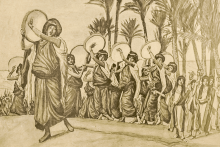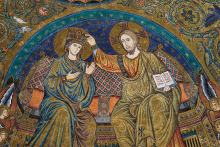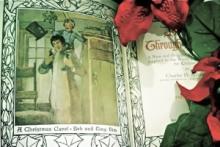magnificat

The women, in their songs, engage their community with authority, devotion, resolve, and assurance, offering praise for God’s work among and with them.

In a cultural moment where religious deconstruction is being widely discussed, Mary offers us hope. I can only imagine over those nine months the questions, doubt, and frustration Mary felt toward the God who called her to be the mother of the savior of the world. And yet, we can have hope in this: that Mary was favored by God regardless of her doubt.

The season of Advent holds a special meaning for me because it reminds me of the power of a mother’s love. While I know “Jesus is the reason for the season,” I cannot help but shift my attention to the woman who brought him into the world — and what she had to endure to birth him.

DURING ADVENT, I always love reading and reflecting on Mary’s Magnificat, which begins, “My soul magnifies the Lord.” This song is more well-known and treasured within the Catholic Church than in my own tradition; I didn’t fully learn to appreciate it until I started delving deeper into Catholic social teaching. It is easy to gloss over how radical and profound this song of praise is (“He has brought down rulers from their thrones but has lifted up the humble. He has filled the hungry with good things but has sent the rich away empty”), both when Mary proclaimed these words as well as for us today. This song, which is only found in the gospel of Luke, comes just after Mary greets her cousin Elizabeth, who is pregnant with John the Baptist and whose baby moves within her womb.
Mary’s song provides a timeless dose of pregnant hope during a year that has been characterized by so much peril, loss, and hardship. As we prepare to put 2021 behind us, it is important to take the time to properly lament the tragedy and heartache of this pastyear, including the hundreds of thousands of largely preventable deaths to COVID-19; the ways our democracy and the right to vote have come under increasing assault; the stark, often-devastating reminders of our mounting climate catastrophe; and so much more.

ON SUFJAN STEVENS' 2012 Christmas album, Silver & Gold, he includes “Ah Holy Jesus,” a hymn about Christ’s crucifixion. Stevens sings: “For me, kind Jesus, was thine incarnation / thy mortal sorrow, and thy life’s oblation / thy death of anguish and thy bitter passion / for my salvation.” The cross on Golgotha casts a long shadow toward Bethlehem. When the child in the manger grows into adulthood, our world kills him. The story of the incarnation is the story of crucifixion.
For Stevens to sing such a hymn during this season reminds us that Jesus was born into an anguished world—an anguish that took hold in his life, an agony unto death. “The whole life of Jesus comes under the heading ‘suffered,’” theologian Karl Barth commented. “For the evangelists Luke and Matthew, the childhood of Jesus, his birth in the stable of Bethlehem, were already under the sign of suffering,” Barth continued. “The entire life of Jesus is lived ... in the shadow of the cross.”
Jesus didn’t offer salvation as an escape plan from our life’s travails but as a commitment to heal us from the habits of sin, the violence that cuts through each of us and the world. Christmas Day doesn’t redeem our wounded world in an instant—as if the old order vanishes with the newborn’s first cry. Instead, Jesus undergoes a human life and entrusts our lives to the Holy Spirit’s care.
Salvation is a salve, the soothing presence of the Spirit. This same Comforter took care of Mary at Jesus’ birth and ministered to him during his passion. “For me, kind Jesus, was thine incarnation ... and thy life’s oblation.”

The scriptures assigned to the church during these days of hopeful waiting are filled with warnings against unjust rulers. This is repeated frequently in the Psalms, in the voice of one crying in the wilderness, and in the prayerful praise offered by Mary. The Magnificat, whose words are sung and prayed hundreds of thousands of times during these days, speak forcefully about the demise of the proud and conceited — and rulers who act like tyrants.

EVERY EMPIRE IN human history has used the tactics of fear. This fear is evident in the fact that for generations a dark skin hue has automatically made a person at best suspect, at worst a criminal. The empire identifies those whose language and nationality are different as less than human. Dehumanization becomes a tool to justify heinous laws, promoting them as necessary to protect citizens from a horde of savages, criminals, rapists, thugs, or whatever new word is used to instill fear.
Our sacred texts tell the stories of emperors, rulers, and pharaohs who justified mass extermination to maintain power. Herod the Great is one example. Herod was a ruler so deranged and paranoid about losing power that he had his wife, brother-in-law, and three sons murdered to wipe away any trace of royal blood who might challenge his throne.
It is under Herod’s rule that we encounter the revolutionary words of Mary as she proclaims her song of praise, the Magnificat (Luke 1:46-55). For generations, Christians have reduced the Magnificat to a simplistic, spiritual song from a docile, obedient girl chosen by God. The political undertones and demands for justice against rulers and laws that oppress God’s people are rarely elevated.

We feel the darkness all around and need to see some light. We feel hopelessness every day and need some hope. We feel despair for our nation’s life and future and need to see and hear some truth. We see authoritarian political leadership on the rise, a White House that literally puts democracy at risk, and feel the need to make clear where true authority lies.
But Christmas says ...

This is not the talk of charity and giving Christmas toys and turkeys to the less fortunate. The language of Mary is the narrative of revolution and redistribution, two words that the powers that be just hate. And while the revolution that Christ brings is not violent, it is nonetheless completely transformational. Mary got it.
Herod did too. The nearest political ruler to the birth of Christ immediately saw the possible implications for him.

National Geographic magazine recently named Mary, the mother of Jesus, “the most powerful woman in the world” as an appraisal of her ongoing influence and popularity. But do Mary’s words and example have a prayer of being heard and effecting change in this time of war?
Indeed, this is war. America has effectively been engaged in continuous warfare since the weeks after September 11, 2001. In a few decades we’ll learn what happens when whole generations of people grow up and take charge of a society that has waged war their entire lives.
Attempts to tone down the descriptions we use for warfare or the way we conceptualize the present conflict don’t change anything. No end is in sight. Others turn up the rhetoric: after the San Bernardino shooting, at least one presidential candidate insisted the USA now finds itself in “the next world war.” Another one puffed up his chest and boasted of his resolve to “carpet bomb” people. We hear this stuff so often, we’ve become numb to its magnitude.

In his first Advent address, Pope Francis directed Christians to be guided by the “Magnificat,” Mary’s song of praise for the coming Christ child. She proclaims that God has “lifted up the lowly and filled the hungry with good things” (Luke 1:52-53). This past Tuesday, Pope Francis heeded his own exhortation by releasing a video message calling for an end to hunger as part of a worldwide “wave of prayer.”
Hundreds of Christian organizations across the globe participated in the “wave of prayer,” which was organized by Caritas International, a confederation of Catholic charities in the Vatican.
“We are in front of a global scandal of around 1 billion people who still suffer from hunger today,” Pope Francis said in his message. “We cannot look the other way.” The wave began at noon on the Pacific island of Samoa and proceeded west with people of faith from each subsequent time zone participating at noon their time.

On Aug. 17, three members of the Russian feminist punk band/performance art group Pussy Riot received the verdict in the criminal case against them: Guilty of "hooliganism" motivated by "religious hatred." Each was sentenced to two years in prison.
As a faith-based community organizer, I spend a great majority of my time trying to get political issues into the church so that the gospel can be relevant to the reality of those on and off the pews.
Therefore, I believe the best place for a “pussy riot” is the church. Although this may seem sacrilegious, here's why:
1. When the church ignores social and political issues it silently blesses injustice. (See slavery, the Holocaust, lynching, and child sexual abuse.) Testimony Time is a set time in many Black Churches when congregants can speak of their pains and triumphs and how God brought them through.
Testimony time is democratic and a time of raw honesty. I call what Pussy Riot did protestifying because they protested by testifying about the political conditions of their country.

The crowd in an Atlanta church on Wednesday night was mostly Protestants, mostly preachers.
The speaker was a professor of preaching at Union Theological Seminary in New York City – one of the icons of the mainstream Protestant world.
Yet Barbara Lundblad’s message was a call for the 1,000 or so people gathered for the annual Festival of Homiletics to “stand with these courageous Roman Catholic sisters.”
She was referring, of course, to the recent crackdown by the Vatican on the Leadership Conference of Women Religious, the organization that represents about 80 percent of the nuns in the U.S.
Lundblad drew on the famous story of Mary, having just learned she was pregnant with Jesus, visiting her cousin, Elizabeth, who was also improbably pregnant.
The Gospel of Luke says that Mary “entered the house of Zechariah and visited Elizabeth.” Lundblad pondered why Luke felt it necessary to put Zechariah in the story at this point. She let that hang unanswered.
Then she noted that when Elizabeth saw Mary, the baby leapt in her womb in recognition of Jesus – a sign that women often come to theology through the experiences of their bodies.
Lundblad said wryly, “Surely Elizabeth would not have been allowed to testify before the Congressional committee on contraception” – an all-male committee with all male witnesses, all representing church groups that do not allow the ordination of women.

Scrooge calls Christmas a “humbug.”
When his nephew tries to convince him otherwise, Scrooge responds:
“Merry Christmas! What right have you to be merry? What reason have you to be merry? You’re poor enough.”
The nephew retorts:
“What right have you to be dismal? What reason have you to be morose? You’re rich enough.”
The nephew concludes with this famous line about the holiday:
“Therefore, uncle, though it has never put a scrap of gold or silver in my pocket, I believe that it has done me good, and will do me good; and I say God bless it!”

The real Christmas announces the birth of Jesus to a world of poverty, pain, and sin, and offers the hope of salvation and justice.
The Fox News Christmas heralds the steady promotion of consumerism, the defense of wealth and power, the adulation of money and markets, and the regular belittling or attacking of efforts to overcome poverty.
The real Christmas offers the joyful promise of peace and the hope of reconciliation with God and between humankind.
The Fox News Christmas proffers the constant drumbeat of war, the reliance on military solutions to every conflict, the demonizing of our enemies, and the gospel of American dominance.
The real Christmas lifts up the Virgin Mary’s song of praise for her baby boy: “He has brought the mighty down from their thrones, and lifted the lowly, he has filled the hungry with good things, and sent the rich empty away.”
The Fox News Christmas would label Mary’s Magnificat as “class warfare.”
So if there is a war on Christmas it ‘s the one being waged by Fox News.

It is unclear how the adjective employed to describe a coniferous tree intended as public celebratory display became a “slap in the face” to the Christian community. It’s especially curious considering that the use of the fir tree around the winter solstice is commonly traced back to Germanic pagan traditions, not Christian ones.
The display of a Christmas tree, a nativity (or manger, or crèche) or any other “stuff” on public property is made central to the celebration of Christ’s birth. Suddenly the profound and unique Christian mystery of the Incarnation — the profound truth of Emmanuel, God with us — is reduced to a set of cultural traditions and a demand for public officials to sponsor and endorse their particular brand of celebration.
When that happens, it’s no longer clear what the difference is between a Christmas tree, a golden calf or a two-story blow-up polyurethane Frosty the Snowman.
Scripture constantly should be challenging our assumptions about our lives and in every aspect of society. Transformation is needed on a personal and also a political level. Scriptural priorities shouldn't be glossed over in order to protect political ideologies and comfort zones.
If we believe that what Jesus taught remains just as relevant today as it did when he physically walked among us, then it should still be a comfort to those on the margins of society and offensive to the wealthy and powerful. That doesn't mean that the wealthy and powerful can't be good and faithful followers of Christ, but Jesus did warn them that their walk will be a hard one. Wealth and power bring unique and difficult temptations ... If you never feel uncomfortable when you read the Gospels then you aren't paying attention.
Wall Street has been devastating Main Street for some time. And when the politicians -- most of them bought by Wall Street -- say nothing, it's called "responsible economics." But when somebody, anybody, complains about people suffering and that the political deck in official Washington has been stacked in favor of Wall Street, the accusation of class warfare quickly emerges. "Just who do these people think they are," they ask. The truth is that the people screaming about class warfare this week aren't really concerned about the warfare. They're just concerned that their class -- or the class that has bought and paid for their political careers -- continues to win the war.
So where is God in all of this? Is God into class warfare? No, of course not. God really does love us all, sinners and saints alike, rich and poor, mansion dwellers and ghetto dwellers. But the God of the Bible has a special concern for the poor and is openly suspicious of the rich. And if that is not clear in the Bible nothing is.
Not every Christian who shares my concern for the poor has the same view on policy or politics. But, here is a prejudice I am not going to back away from.
To be a follower of Christ is to be biased for the poor.
In life, we all have our biases. Some of them are natural tendencies or inclinations and others are habituated. Our culture tells us to be biased -- in a deferential sense -- towards those who can pay us back or who can look out for us in return. Society tells us to get in with the strong and the powerful because they will give us strength and power in return.
Jesus teaches something very different.
